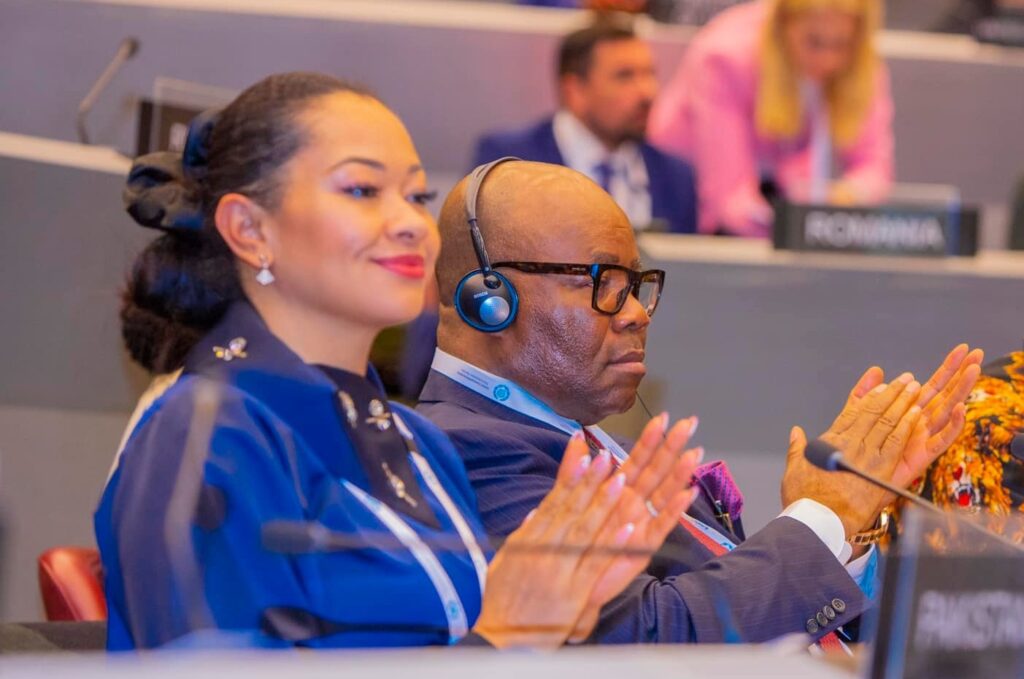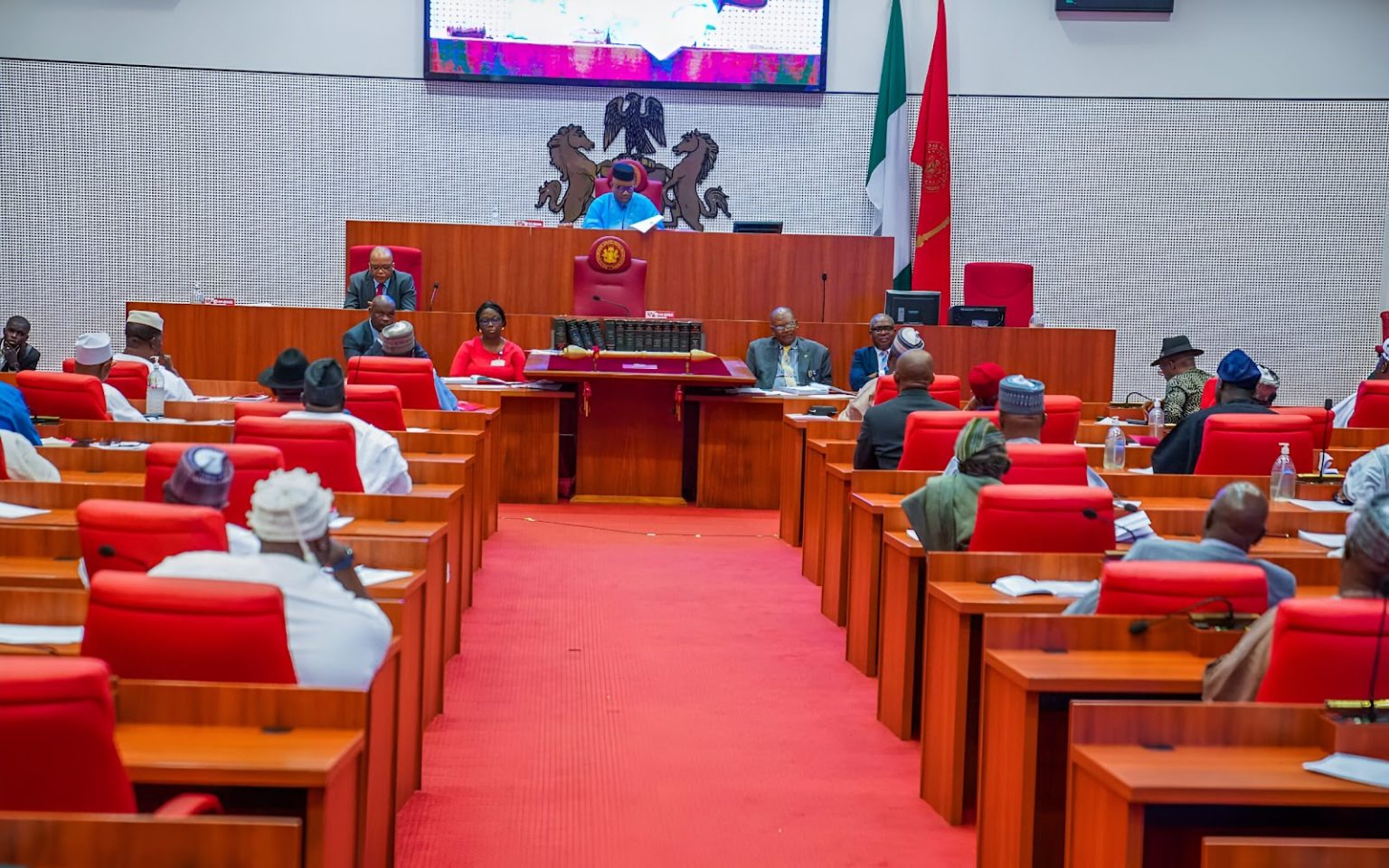On February 20, 2025, Nigeria‘s Senate President Godswill Akpabio ordered Senator Natasha Akpoti-Uduaghan (Kogi Central) to be “thrown out” of the red chamber after she defied him on the floor of the House.
Five days later (February 25), the Senator was referred to a Senate disciplinary committee and subsequently suspended for six months based on the recommendation of the Ethics, Code of Conduct, and Public Petitions Committee.
This is not the first time a lawmaker has been suspended by the Senate and/or from the House of Representatives (the Red chamber). The two chambers (the Senate and the House of Representatives) made the Nigeria National Assembly.
The suspension has taken several twists, including Natasha accusing the Senate President of sexual harassment, Akpabio’s wife suing Natasha and Natasha challenging her suspension in court.
On social media, users have questioned the legality of the suspension, insisting that the Senate is not clothed with such powers constitutionally. For others, the courts were likely to overturn the suspension based on precedents.

Nigeria’s Senate President Godswill Akpabio with Senator Natasha Akpoti-Uduaghan at an event
Does the law permit the Senate to suspend a Senator?
FactSpace Nigeria’s checks in the 1999 Constitution of the Federal Republic of Nigeria show that the National Assembly is vested with the powers to regulate their procedure.
- Section 60, under the heading “Regulation of procedure” reads in part: “Subject to the provisions of this Constitution, the Senate or the House of Representatives shall have power to regulate its own procedure, including the procedure for summoning and recess of the House.”
- Further, Section 88 (1) (a) of the constitution states that each House of the National Assembly “shall have power by resolution published in its journal or in the Official Gazette of the Government of the Federation to direct or cause to be directed investigation into – (a) any matter or thing with respect to which it has power to make laws.”
The Senate Committee on Ethics, Privileges and Public Petitions, references the above laws on its website, before drawing on the Senate’s Standing Rules 2015 (as amended in 2023), Order 97 (4) (a)(b) and (c) which it stresses grants the Committee the jurisdiction to consider all petitions referred to it.
Rule 8 of the National Assembly Code of Ethics (2015) also makes express pronouncements on sanctions for lawmakers.
It reads in part: “Any one or more of the sanctions set out below may be imposed with the approval of a simple majority of the Chamber. The severity of the sanction shall reflect the enormity of the breach. Account shall be taken of any remorse shown and of whether the offender is a first offender.”
- 8.1 Reprimand, admonition, or censure to be administered in writing by the
- President or the Speaker as the case may be.
- 8.2 Apology to the Chamber, which may be oral or in writing.
- 8.3 Withdrawal of privileges for a specified period.
- 8.4 Removal from positions of responsibility, including demotion and stripping of a Committee seat.
- 8.5 Suspension from the Chamber or from a Committee for a definite period.
In an interview with FactSpace Nigeria, Yusha’u Sani Yankuzo, Esq. Executive Director of Centre for Human Rights & Social Advancement (CEFSAN) said: “The Nigerian Senate, like its counterparts around the world, has mechanisms in place to ensure its members conduct themselves in a manner befitting their office.
“However, while the Senate has this authority, it is not limitless. It must comply with fundamental constitutional principles, particularly: The Right to Fair Hearing (Section 36 of the Constitution) and The Right of Constituents to Representation. Thus, while discipline is necessary, it must be balanced with democratic and constitutional safeguards,” he stressed.
 Senator Akpoti-Uduaghan in her office
Senator Akpoti-Uduaghan in her office
What other lawyers have said:
A number of lawyers have expressed varying opinions over the suspension of the Senator in a report by the Punch Newspaper. Among them, the Chairperson of the Nigerian Bar Association (NBA) Women Forum, Huwaila Muhammad, who told local media outlets that Akpoti-Uduaghan deserved a fair hearing before the decision was taken.
“To start with I will say on the suspension, we are all lawyers and would like to see fairness across board. We know the allegation is very big and he who asserts must prove so we will want her to prove the allegations and we expect fairness in it.
“I see her suspension as a kind of intimidation; you cannot be a judge in your own court. If something affects you, slide by the side and let justice take its course because we need to see fairness.
“The question here is: Did the committee call her before suspending her? Did she refuse to come? Did she send a representation? If she was not called then what was the yardstick used in suspending her and if she was called and she refused to go that will be very wrong of her because she was called to prove her innocence and her refusing to honour the invite will be wrong,” she said.
On his part, Professor Itsey Sagay, a Senior Advocate of Nigeria (SAN) said insofar as the matter was before the court, the courts should have the final say.
“The matter is in court as I know and I’m surprised they didn’t leave it at that stage. I feel very sympathetic towards her because in an assembly full of men there’s a tendency towards self-defence but the men rather than looking at the matter objectively, they didn’t,” he said.
Chief Awa Kalu, SAN, said: “My comment on the decision of the Senate is that it is hasty.”
While Wale Balogun (SAN), argued that there are procedural steps that should be followed before the lawmaker was suspended.
“Legally, it is an internal affair of the legislators and they have their rules of engagement provided in exercising their right and rules of engagement which they comply with as their own internal rules and regulations and then in addition to that, exercising such actions in compliance with the Constitution.
‘’For instance, was she heard? This is a fundamental constitutional provision. The Constitution requires that your internal procedure notwithstanding, should ensure that the person is invited. She should have been heard,” he pointed out.
Two times court dismissed suspension of Senators; Senate vs Ovie Omo-Agege – 2018
In May 2018, a Federal High Court in Abuja nullified a six-month suspension slapped on Ovie-OmoAgege, the representative of Delta Central Senatorial District by Senate.
He was suspended for holding a press conference in which he alleged the Senate was plotting against then-President Muhammadu Buhari by amending the electoral act. The Senate Committee on Ethics defied a court order and recommended 181 days’ suspension for Omo-Agege.
However, Justice Nnamdi Dimgba said while the Senate has the constitutional duty to discipline a member, “such disciplinary measures must comply with provisions of the law.”
Justice Nnamdi ruled that the Senate did not have the power to suspend a member for more than 14 days as stipulated in the standing orders. The suspension was reversed, and an order was made that the Senate pay Omo-Agege all his outstanding salaries and allowances.
The case between Senate vs Ali Ndume – 2017
Senator Ali Ndume (Borno South senatorial district) also successfully sued the Senate over his suspension with the courts stating that the decision was “illegal, unlawful and unconstitutional.”
Justice Babatunde Quadri of the Federal High Court ruled in November 2017 that the decision to suspend Ndume for 90 legislative days (six months) was illegal. The suspension was over an allegation he made against the then Senate President, Bukola Saraki.
The judge also ordered the senate to pay Ndume all his salaries and allowances.
Timeline of the Natasha suspension saga:
- February 20 – Senate president orders Senator Natasha Akpoti-Uduaghan to be thrown out after she defied him on change in her seat
- February 25 – Referral of unparliamentary conduct to Committee on Ethics, Code of Conduct and Public Petitions for investigation
- March 4 – Court stops Senate probe committee from proceeding with its work
- March 6 – Natasha submits petition against Senate President; Committee throws out the petition
- March 7 – The Senator was suspended for 6 months
- March 19 – Court vacates order against suspension probe
- March 24 – Petition to recall Natsaha presented by constituents to INEC
- April 3 – INEC dismisses recall petition as it fails to meet constitutional threshold
- April 4 – Court bars parties from granting media interviews
On the general issue of Senator Natasha’s suspension, Yusha’u Sani Yankuzo said: “The Senate should be setting an example by upholding the rule of law and promoting and protecting fundamental human rights, not stamping them out.
“Punishing Mrs Akpoti-Uduaghan solely for peacefully expressing herself is unlawful, unnecessary and disproportionate. Her suspension would also have a disproportionate chilling effect on the ability of other members of the Senate to freely express themselves and exercise their human rights.
“The right to express one’s opinion is of paramount importance, not only because it oils the engine of a representative democracy but also because it creates a free and open environment.
“The right to freedom of expression is a fundamental individual human right which is also a cornerstone of democracy and a means of ensuring the respect for all human rights and freedoms,” he stressed.
Researched by Alfa Shaban













